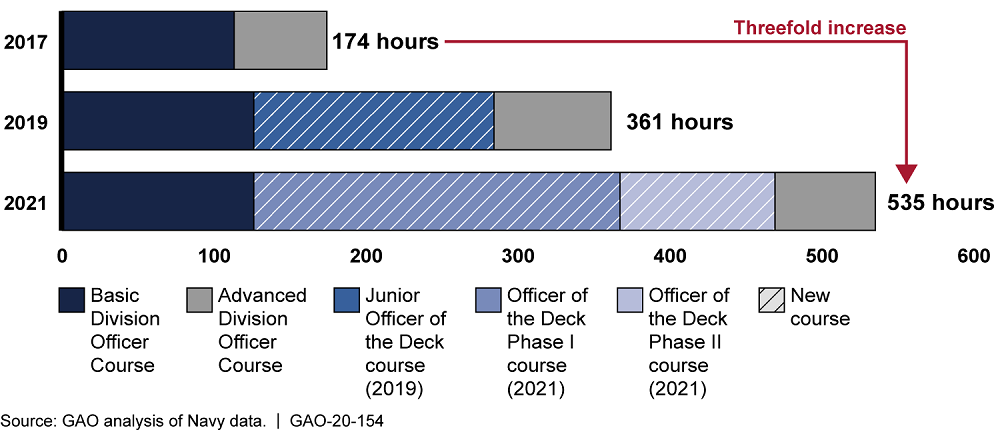GAO: U.S. Navy Needs to Evaluate Training Improvements
In a new report, the U.S. Government Accountability Office recommends that the U.S. Navy should do more to evaluate the success of its post-2017 training reforms.
In the wake of the human error-driven collisions involving the USS Fitzgerald and USS John S. McCain in 2017, the Navy increased its training resources and requirements for surface warfare officers (SWOs). It plans to inrease initial bridge training hours for SWOs by a factor of three by 2021, and it has added more classroom and simulator time to existing training courses to improve watchkeeping skills.
Prior to 2017, new SWOs had to have about 175 hours of shiphandling and watchstanding training before shipping out. The Navy increased that to 200 hours after the collision, and this June it added a four-week, 158-hour watchkeeping and shiphandling course to the required curriculum. Additional changes in 2021 will add another 185 hours, effectively tripling the time for training.

While the Navy is making significant changes to SWO training, the GAO believes it is not doing enough to evaluate how well these changes are working. GAO asserts that the Navy has not:
- identified a method to solicit fleet-wide feedback on the quality of the increased training for SWOs;
- planned watchkeeping competency “spot checks” like those instituted after the 2017 collisions, despite Navy inspectors having found issues with more than 80 percent of SWOs’ ship-driving skills;
- provided standard criteria to commanding officers for qualifying SWOs to drive ships, contributing to significant variance in ship-driving experience and competency levels across the fleet; nor
- developed a specific plan to analyze and use information from the new logbooks in which SWOs document their watchkeeping experience.
GAO's interviews with SWOs and commanders in the field determined that shipboard qualification standards are quite variable: some COs are qualifying their new officers without requiring any prior experience on the bridge, while other commands provide considerable hands-on training. Circumstances differ for new SWOs assigned to ships in maintenance and those deployed at sea.
Similarly, the utility of the new SWO watchstanding logbook varies by command. "SWOs in five of 24 discussion groups reported that logbooks are completed with inconsistent quality or not completed at all. Additionally, SWOs in four of 24 discussion groups reported that they are unaware of any plans to use the logbook information to identify any additional training needs," GAO found.
GAO noted that navigation-related vessel casualties are an ongoing concern for the Navy, as they are for most large shipowners. In February, the cruiser USS Leyte Gulf had a minor collision with the auxiliary USNS Robert E. Peary during an underway replenishment operation off Florida. In June, the LCS USS Billings had a minor allision with a moored merchant ship while leaving a pier in Montreal. The causal factors behind these incidents have not been released.
